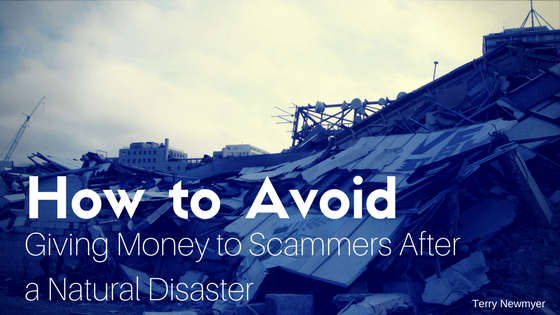This year, we saw wicked storms hit the coastlines of the United States. Hurricanes Harvey, Irma, and Maria devastated large populations in Texas, Florida, Puerto Rico, and many other areas. As Americans, most of us feel the need to help the victims of these storms after the fact, which is why for weeks after the storm, grocery and convenience stores in areas across the country had options to donate after each transaction.
We know there’s a need after these disasters. Video clips on our news outlets show thousands of people displaced by the flooding and citizens from around the country open their hearts, and wallets, to those in need. Unfortunately, these large-scale natural disasters make it easier for scammers to take advantage of the situation and make money off of the thoughtfulness of others.
What’s more is these scammers will even try to take advantage of the victims’ already devastating situation and attempt to make money off of their misfortune. Whether you’re just trying to help out or you are the victim of a natural disaster, it’s best to arm yourself with the knowledge of the characteristics of scammer so you and your loved ones avoid giving money to the wrong people.
Be Aware
The first thing to realize is that everyone is susceptible to scammers. Every year, 30 million Americans will fall victim to some sort of scam, and they don’t just fall into one demographic of people. The victims range from the highly educated to less educated and young to the elderly population. Just because you believe you won’t become a victim because you’re smarter than that doesn’t mean it can’t happen to you. The best way to safeguard your money and avoid these scams is by educating yourself on the research done because scammers will inevitably continue to work on their scams so they become more and more foolproof.
Beware of Fake Websites
According to the Center for Internet Security, as Hurricane Harvey began to make landfall over the state of Texas, hundreds of domain names were purchased that contained hurricane-related words, which could be used to look like an actual charity site, but actually, be run by scammers. Always be on high alert when you think you may be entering these sites. The URL address will be similar to a real charity but not exact. For example, the American Red Cross’ website is located at www.redcross.org, if you see a .net or some other variation of this, you can be assured it’s not the officially authorized American Red Cross site. Large organizations will often purchase addresses that are similar so that they are automatically redirected to the official site, but they don’t necessarily get all of the options. For most nonprofit organizations and charities, their website will end in a .org; always be mindful but especially if the website address ends in a .com or .net.
Check it out
Before donating to any organization, make sure you know they are an official charity or nonprofit organization. There are several options online to check the validity of an organization such as Charity Navigator and GuideStar. GiveWell also gives an in-depth look into what the organization is doing, how effective they are at giving back to their mission, and overall transparency. This will give you a clear understanding of just how much good they are doing and whether you would like to be associated with them.
Don’t give to door-to-door solicitors
When you get a knock on your door from a charity representative, put your guard up. Reputable charities are starting to steer away from door to door fundraising because most people are already leery of that the representatives could be scammers and not actual representatives. If you do answer the door, tell them you aren’t comfortable giving money this way. If it is a reputable charity, they will give you a pamphlet with information on it to donate money. If they don’t leave it at that and attempt to pressure you into giving money, end the conversation right away. Scammers will try to manipulate your goodwill by trying to pressure you, while reputable charities will understand your apprehension. It’s always good to keep in the back of your mind that anyone could pose as a charity representative with the right information in tow, so do your research after you talk to them before you give them money.
No charity donates all the proceeds
When someone asks you for a donation to their cause and tells you that all the money will go to the cause, get on the defensive. Every single charity and nonprofit organization has some level of fees they have to pay for in order to keep it afloat. Administrative costs and fundraising costs are typically paid for as cheaply as possible, but they’re still costs that need to be paid for.
Fake policy cancellation calls
After a natural disaster, homeowners that sustain damage to their homes are fearful that their insurance policy will not cover the damages. Scammers have taken advantage of this fear by calling homeowners and telling them that their policy will be canceled unless they pay for it immediately. If you receive one of these calls, hang up immediately and call your insurance company. An agent will be able to tell you if your account is actually past due. Never give your personal information to anyone if you’re unsure if they’re actually who they say they are.
It’s unfortunate that scammers come out of the woodwork in times of natural disaster when all anyone wants to do is help the affected. Be mindful of potential scams and stay up to date on recent scams by visiting the Federal Trade Commission’s website for Consumer Information.

